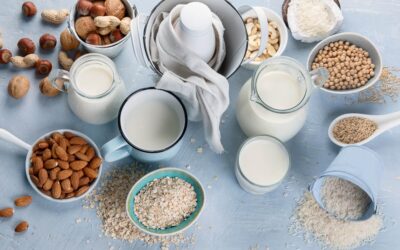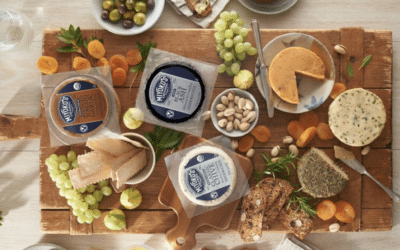Jackie Norman is a former New Zealand dairy farmworker who now volunteers full-time for the advocacy group, Vegan FTA. In this interview, Norman details her 18-year experience in the farm industry and sends a message to everyone—farmers and advocates alike—that we need to work together to create a more humane, sustainable, and healthier world for all of its inhabitants.
Switch4Good: How did you end up working in the dairy industry?
Jackie Norman: I totally fell into it—it was the last thing I ever imagined myself doing! I was 19 years old and had led a very sheltered life, growing up in a tiny Hampshire village in the UK. The only experience I’d ever had of cows up until then was watching them graze peacefully in the fields behind our house. I thought that’s what all farming was like. I met a chap from New Zealand and we became a couple. He was returning back to his homeland and asked me to go with him.
Everything happened quite fast and I didn’t have a work permit for the first year I was there. My partner however had grown up on a dairy farm and had plenty of work experience, so it wasn’t hard for him to find a job. Like pretty much all farming jobs over here, it was a live-in situation and we moved in with our new boss. I soon became bored being stuck at home playing house while everyone else was on the farm, so I learned to milk cows for something to do. I felt very proud to be doing something so ‘wholesome’ and ‘outdoorsy,’ not to mention holding my own in what was pretty much a male-dominated industry. By the end of my first year, I had gained my residency and learned enough that my partner and I could progress onto other farms where we both had equal responsibility.
View this post on Instagram
S4G: What roles did you hold during your time in the dairy industry?
JN: That first year I only helped to milk the cows, but as the years progressed I was able to milk 220 cows by myself. I was also responsible for rearing all the calves; a job that was incredibly intense but I took great pride in. I drove the tractor, did a lot of fencing, learned how to fix things that were broken. I was able to administer medicine to the animals both orally and intravenously and even was able to calve a cow by myself. I prided myself on being able to do all that, I didn’t know too many other women who were able to do it all. I should stress that at no time was I ever a farm owner, we were just very good at making our bosses a lot of money.
S4G: Was there anything about your job that didn’t sit well with you?
JN: There were a lot of practices I didn’t like about dairy farming, and over time I became affected by them. I felt so sorry for the poor cows during breeding season, especially the ones who got artificially inseminated. I could never watch and would always turn away as I would see these poor girls frozen to the spot with an enormous human arm buried up to the shoulder in their rectum, while the other hand was inserting a long straw into their vagina. It was horrible and the cows would often bleed rectally afterward. Their reproductive organs and systems were always being manipulated. Another procedure they have to suffer the indignity of going through is the use of CIDR’s, which are devices that get inserted into the cows’ vaginas. They release hormones that make the cows all come on heat at the same time, so they all get pregnant around the same time and then calve at the same time.
I also used to really hate taking the baby calves away from their mothers. I thought it was bad enough at the time but looking back, I can now see it as the most bizarre and inhumane thing one species would do to another—to deliberately rob a mother from her baby. I knew cows as old as 16 who were still being milked on dairy farms. Do you know what that meant for her? It meant that she gave birth 14 times and every single time her baby was taken away.
One of the weirder practices I witnessed was when one of our bosses told us we had to cut off the girl calves’ extra teats using nothing more than a sharp pair of scissors and an iodine spray. He wanted his animals to have four perfect teats for when they would be ready to milk in two years’ time, however calves are often born with extra, smaller ones. It doesn’t make any difference at all, it was simply an aesthetic thing. Can you imagine that in a human perspective; someone just cutting off one of your nipples with scissors and no anesthetic? Yet this is just one of many practices deemed to be ‘OK’.
View this post on Instagram
S4G: What are bobby calves?
JN: I think the worst of all though was the ‘bobby calves.’ They are the ones who don’t get to live, who are slaughtered at four days old, although that’s a bit of a myth really. There are many who get sent to their deaths at less than that. As long as they have had a feed of colostrum, are of a suitable size and weight and their navels are dry, they get put on the truck. It was my job to feed them, and it was heartbreaking. I was taught from the start not to get too attached to them, that these ones weren’t staying due to being the ‘wrong’ sex or breed. Every single time the truck came to pick them up I would cry. I cried about a lot of things, but I would always just get told to ‘harden up’ and ‘it’s sad, but that’s just the way it is’. It never got easier but after a while, you just come to believe and accept it. When you’re in the industry, that’s what everyone else around you thinks and believes and you get teased for being soft-hearted. I think the more time which goes on since being out of the industry, the more those things haunt me.
S4G: What do you say to people who say “at least they (cows) had a good life?”
JN: I can say with absolute truth and honesty, no dairy cow has a good life. Even when I was milking the cows myself and prided myself on being as kind as possible—even then I often thought that a dairy cow has the most wretched existence I had ever come across. Their bodies are not their own, their babies are not their own, and even their tails are not their own—their long swishing tails are usually docked so short that they can’t even do the most basic things such as swat away flies in the height of summer. They have to walk miles every day in all weathers. The fact that a 5-foot nothing, 50kg little thing like me was able to be in complete control of 220 enormous animals, and that they were scared of me? That’s crazy! And wrong, and sad. Dairy cows are terrified of humans; they remind me of scared children. Always doing their best to toe the line, and to be unobtrusive for fear of incurring the wrath of the farmer. Even ones like me, who liked to think I was kind to them. Just because I never hit or yelled at them like other farmers, to their mind I was just the same.
I think a big factor in how this exploitation is allowed to happen is that as humans we completely fail to put ourselves in the animals’ shoes. Can you imagine how it would be if we treated humans the same way? For example, if we accidentally hit a fellow human with our car while they were crossing the street, would we just wave it away and say ‘Oh that’s a bit of a shame! At least they had a good life.’” The same goes for taking their babies. As someone who has personally lost a newborn child, I can tell you that it is the worst thing you can endure. Twenty-five years later, it still has not gotten any easier and you don’t forget. Yet this is what we do to mother cows, time and time again. The only cow who has a good life is a cow who is allowed to live that life without being exploited and robbed of their offspring and ultimately their lives.
View this post on Instagram
S4G: Many consumers believe farmers love their cows. Can you explain the complicated relationship within the industry?
JN: This is a tricky one and you’re right, it is a very complicated relationship which is incredibly hard to understand. I have witnessed many times first hand what the stress of the farming industry does to these people; it makes them lash out and be permanently angry and it is those who cannot speak or defend themselves who bear the brunt. Saying that, there is absolutely no excuse for animal abuse, ever.
Personally speaking, I can say that I most definitely did love the animals in my care. All the cows and calves had names, the cows got patted and stroked, the calves had many kisses and cuddles and I recognized like most farmers do that every animal has a different personality. They have friends, they don’t like to be separated, and they have a hierarchy. They are creatures of routine and they all like to walk into the milking shed in a certain order that rarely differs. There were plenty of farmers I knew who were like me. It’s not that farmers don’t love their animals, they simply don’t realize what they are doing to them. They really, truly don’t. Society is so conditioned to believe that drinking cow’s milk is the most natural, nutritious food in the world and farmers believe they are doing an incredibly essential job in feeding the nation.
While I wouldn’t say all farmers ‘love’ their cows, I would say that a good number do have a genuine fondness for them. It’s like there is that flicker of compassion there, but too much is buried by generations of conditioning. It probably sounds really warped, but they do get sad when their favorite cows go to ‘The Works’ (slaughterhouse), even if they are the ones who have made the decision to send them there! In all my years of farming, I never went to a slaughterhouse or saw what went on there, and most farmers don’t. ‘The Works’ is just an expression, it means nothing. When an animal leaves the farm, you don’t really think about what happens to them once they are put on that truck, they’re just gone. If farmers knew the terror, the abuse, the inhumanity and the ultimate disrespect of the animal who spent their life serving them every waking moment, if they saw for themselves what happened to ‘Daisy’ or ‘Mabel’ once they left their care, I truly believe there would be a lot more farmers growing crops rather than animals. They don’t wish these animals any harm, it’s just they don’t see how harmful the industry already is.
View this post on Instagram
S4G: If you could say one thing to your former co-workers, what would it be?
JN: I would say to them that they are still very valuable, that we need farmers now more than ever, but we need them to be farming different things for the sake of the planet, for the animals, our health, everything. The more diversity of plants they can grow and we humans can consume, the more resilience we will have against pandemics and there will be enough resources on earth to feed everyone, without causing harm to another living being. We need to work together though, to create positive change and help farmers to see and learn the benefits. There are a lot of great things happening, organizations and events designed to help farmers transition into an animal-free way of farming. We should definitely be encouraging farmers to attend and investigate them, to learn what their land is capable of, but vegans need to be attending them too so that rather than simply challenging farmers and telling them what they are doing is bad, we can also present them with solutions. We need to be able to show them just how fantastic the future can look and how we need them to be an essential part of that.
Image credit: Beth Redwood








